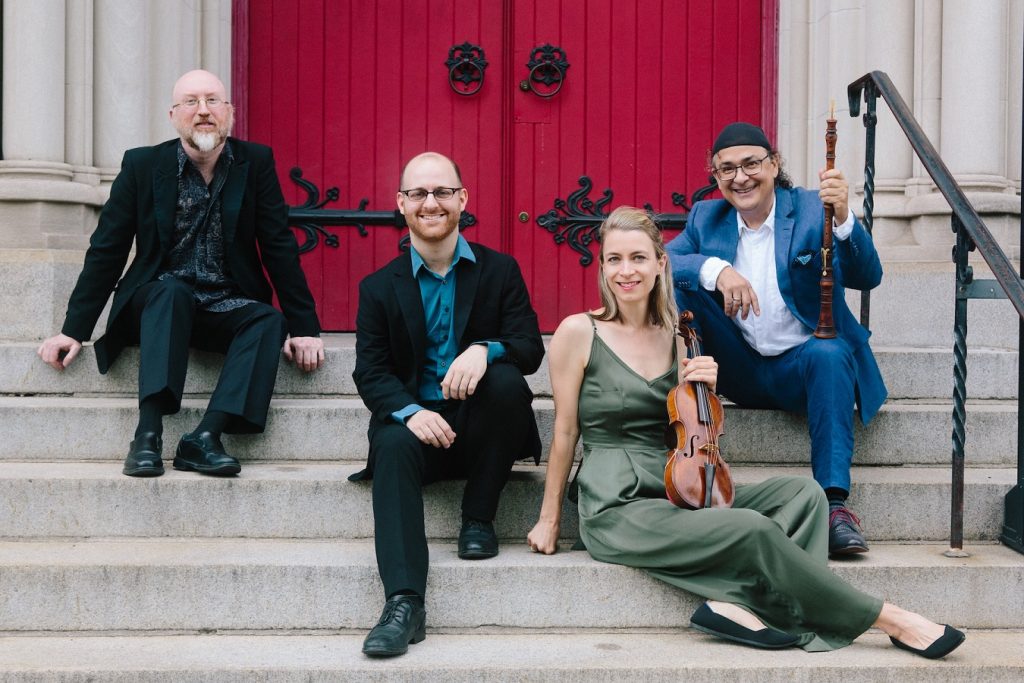Early Music Now Goes To The Devil
Baroque music by House of Time balances devilish music with angelic fare.
Early Music Now closes the 2022-23 season at Saint Paul’s Episcopal Church Saturday featuring some of the best ensemble music from the mid-Baroque era. House of Time, a ‘mixed’ quartet, features Gonzalo X. Ruiz on oboe, recorder & guitar; Tatiana Daubek, violin; Matt Zucker, cello; and Elliot Figg, harpsichord. They will perform on period instruments. The Baroque era marked a revolutionary departure from the Renaissance era in classical music. Whereas much Renaissance music was written for voice and intended for meditative religious services, Baroque compositions sought to introduce variety, energy, and personal virtuosity, with many instrumental-only pieces being composed in accordance with new theories that suggested the stimulation of music could lead to better health.
The House of Time’s program, “Angels and Demons,” has carefully chosen works that evoke strong emotions. Some of these works are inspired by God, while others have gained notoriety due to their difficulty and the suggestion that the performer has made a pact with the devil. These more notorious pieces require a great deal of skill and dedication to master, making them a challenge for even the most experienced players.
Arcangelo Corelli was instrumental in burnishing the reputation of instrumental music in the late 17th century with a proliferation of popular ensemble works. Corelli’s role as a violin teacher led to an increased focus on the role of key players in an ensemble. House of Time member Ruiz suggests that “the biggest impact that Corelli had wasn’t so much for the violin technique as for the crystalline perfection of his music.” However, those who followed in the early 18th century introduced ever-more complex virtuoso performances.
Sonatas composed by Jacob Klein for cello, Antonio Vivaldi for oboe, and Giuseppe Tartini for violin on the program demonstrate how performers were highlighted within an ensemble. In a detailed analysis of the Vivaldi oboe sonata, Ruiz has written, “The last movement is set as a sort of grotesque minuet over which the oboe is forced through grueling and relentless triplets. It is the kind of dancing you would do if someone were shooting bullets at your feet. At the end our poor soul appears to be dragged kicking and screaming to the pits of Hell like Don Giovanni.” And Tartini (likely performing on the Stradivarius Frank Almond now plays) claimed that the devil himself appeared to him in a dream, sat on the edge of his bed, and showed him the complex sequence of trilled double stops in the last movement.
The House of Time selected as ‘Angelic’ works a polished transcendent work, the Trio Sonata, Op. 4, No. 1 by Corelli, the Suite from an opera Alcyone by famed French viola da gambist Marin Marais and a violin solo by Heinrich Biber, a Passacaglia nicknamed The Guardian Angel. Biber wrote a cycle of fifteen works on the Mysteries of the Rosary, including the passacaglia on this program.
Beyond introducing ‘Angels’ and ‘Demons’ as opposing concepts, the selections work together. The program notes observe that the choices explore “works and composers whose appeal depended in part on this suspicion of supernatural influence, whether for good or evil.” This results in a varied but always interesting program, some of the best of ensemble Baroque and the origins of chamber music we hear today.
The House of Time concert begins at 5:00 p.m., Saturday, April 29, at St. Paul’s Episcopal Church (914 E. Knapp St.) There will be a pre-concert lecture in Saint Paul’s Great Hall at 4:00 p.m. Tickets can be ordered at this link. Parking is available on the street and in the Lincoln Center of the Arts parking lot across Marshall. The accessibility ramp is located through the garden on Knapp St., just east of the main entrance.
Preview
-
A Sacred Choir, 70 Voices Strong
 Dec 14th, 2025 by Martha Brown
Dec 14th, 2025 by Martha Brown
-
Prometheus Trio Goes Bohemian
 Dec 3rd, 2025 by Martha Brown
Dec 3rd, 2025 by Martha Brown
-
Present Music Offers New Choral Works
 Nov 20th, 2025 by Michael Barndt
Nov 20th, 2025 by Michael Barndt





















